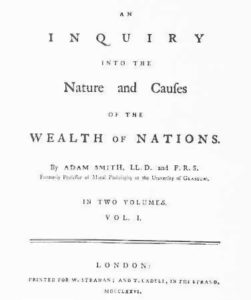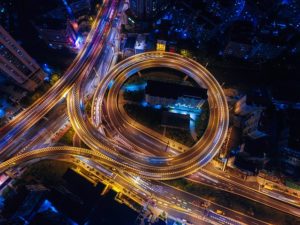About this Economics course

This is a free economics course covering five topics. After a general overview and history, you will explore what’s on the horizon as well as both current problems and opportunities in the field. And since there is significant value in practicality, this free course ends with a “next steps” section for economics professionals.
Course Navigation
- What Is Economics?
- History of Economics
- Future of Economics
- Challenges & Opportunities in Economics
- Next Steps for Economics Professionals
This free online economics course directs you toward free videos, courses, podcasts, and resources coupled with questions to aid in processing the critical field of economics. Each section is created to offer two to three hours of learning material.
Whenever you see this image, it is time to stop and watch, listen, or read, and reflect.
At the end of each section in this free course, there is an opportunity for to invest further. These suggestions offer courses, associations, books, and conferences within a wide range of financial and time investments, to further enrichment in the field of Economics.

1│What Is Economics?
Economics is a social science. Economists study the ways people allocate resources, on both a collective and individual level, to be produced, distributed, and consumed. A crucial economic principle is that humans have unlimited wants, but we live in a world with limited resources to fulfill those wants. As a result, efficiency and productivity are highly important in economic thinking since productivity and efficiency when it comes to resources that can improve human living standards.

The field of economics is vast. There are whole sloughs of economic theories, indicators, and systems to consider depending on your area of interest. Try making lists of all the various systems, indicators, and theories you can think of in economics. Then give this economics article a quick read. It covers some of the big ones, though it’s certainly not exhaustive.
Macro vs. Micro

Macroeconomics and microeconomics are the two significant disciplines of economics. Macroeconomics focuses on economies, from regional to national to international. Macroeconomists study economic cycles and high-level economic growth around things like unemployment rates, foreign trade, levels of inflation rates, government monetary policies, or how the Gross Domestic Product changes. It’s macroeconomics you usually hear about in the news.
Microeconomics, as the name suggests, instead looks at individual consumers’ and producers’ behaviors. Microeconomists want to understand things like how and why we value goods differently, how individual actors make financial decisions, or how they respond to the change in the price of something, for example. They study how labor is allocated, how firms are organized, supply and demand dynamics, and how individuals approach risks.
While combined data from microeconomics create what we see in macroeconomics, these two disciplines are distinct. They use different theories, different models, and different types of research.

Watch this video on macroeconomics and this lecture on microeconomics. What crossover do you see between the two disciplines? Where do they seem distinctly different? How can they be used in tandem to gain a better overall economic picture of a country, an individual, an organization? Or is that even a helpful question to ask?
Rational Behavior & Behavioral Economics
Human actions are closely examined in economics and work on the idea that people use rational behavior in their actions and choices. Most classical theories in economics use the concept of rational behavior, meaning that people are looking for the most benefit or use from something and the least harm.

Read this article about rational behavior and consider some of your recent actions, decisions, or choices. Do they ultimately fall under this idea of rational behavior? If you say no about any of them, dig a little deeper for your underlying motive. How much did emotional factors impact what you did?

Behavioral economics understands that people have emotions and can easily be distracted; thus, we do not always act rationally, or at least in a way that seems rational. Watch this video on behavioral economics and consider the non-rational reasons people do what they do and how behavioral economics tries to account for this.
Further Thought

Make your way through this economics video series from Crash Course. These 35 episodes use standard, college-level curricula to give viewers a broad overview of economics. You’ll learn the fundamentals of economics, be able to apply economic analysis to real-world situations, and understand the role of various governments in economics.
Further Investment

Once this free online economics course is completed, take a course on microeconomics or macroeconomics from Udemy. Udemy’s courses are all built so you can go at your own pace, and you’ll have lifetime access.

2│History of Economics
Hesiod & Scarcity

Hesiod was a Greek poet from the 8th century and one of the earliest Western economic thinkers. In his poem Works and Days, Hesiod introduced three economic ideas that are still relevant today: scarcity, shame, and envy. In this segment on Hesiod’s poem from NPR’s The Indicator, listen for how the three themes are still applied in economics today.
The Wealth of Nations

Jump forward to 1776, and we arrive at Adam Smith and his seminal book, An Inquiry Into the Nature and Causes of the Wealth of Nations. Smith is widely considered to be the father of modern, Western, economic theory. Some of the significant themes in Smith’s work include the ideas that the market should be free, a nation’s wealth is in the goods and services it creates, competition regulates itself, and the government should not play a role in the market. Smith believed that individuals could create economic and social stability for everyone by acting in their self-interest.

If it’s been a minute since you read The Wealth of Nations, here is a synopsis from The Adam Smith Institute. As you read, consider the ways your country’s economy is in line with Smith’s theories or not and what the repercussions are either way.
Malthus, Marx, Keynes, and More
In An Essay on the Principle of Population, Thomas Malthus, writing at the beginning of the Industrial Revolution, was concerned that as populations grew, they would decimate the food supply. However, as the population grew, technological innovations also helped food production keep up with the growing demand. Nevertheless, Malthus’ work meant economics began to focus more on scarcity over demand.

The idea of scarcity in economics also influenced Karl Marx, who believed that instabilities in capitalism and free markets would lead to class warfare. Take some time to watch this overview of some economic schools of thought throughout the past several hundred years. As you watch, consider how these different schools have influenced world economies today. In particular, consider the ways economic theory has changed over time in the way it regards things like government intervention, for example.
Keynes and Onward

The Keynesian economic theory runs on the idea that the government can and should spend money on things like infrastructure, unemployment benefits, healthcare, and education to help boost economic growth. As we learned in the last video, Keynes’ theory was borne out of a need to help understand The Great Depression, but these ideas stuck, and the world today more or less runs on Keynesian economics.

However, since the 2008 recession, many argue that it is no longer a useful theory. Here’s one article from 2014 in favor of Keynes and another from 2012 questioning Keynesian economic relevance. What’s your perspective? Where does Keynesian economics hold up or fall apart in today’s world? We’ll talk more about the new challenge of the COVID-19 pandemic later on, which also undoubtedly plays a role in the economic theories of today.
The U.S. Presidents’ Economic Impact
The U.S. presidents’ fiscal policies shape the country’s GDP growth rate, a direct measure, for many, of presidential success. It’s interesting to look at past U.S. presidents and compare their GDP growth rates with other administrations.

As you read this GDP article from The Balance, consider how the different policies played with other factors, like foreign wars. Also, be sure to check out their list of the presidents’ economic plans on the left menu for more in-depth coverage.
Further Thought

Check out the Institute for New Economic Thinking’s History of Economic Thought Website. This website is full of resources and information on economic thought throughout known history. It is intended for anyone who has an interest in learning more about economics from a historical perspective. There are economists’ profiles, schools of thought, and various essays on different economic subjects.
Check out the Who Makes Cents? Podcast. This monthly podcast covers the history of capitalism and how it has changed over time.
Further Investment

After finishing this free economics course, enroll in the Introduction to Economic Theories course from Erasmus University Rotterdam through Coursera. This course covers the theories of Social Economics, Institutional Economics, Post Keynesian economics, and Neoclassical Economics. It takes about 41 hours to complete.

3│Future of Economics
COVID-19 and Economic Implications

The global economic implications of the COVID-19 pandemic are numerous. The pandemic has created severe disruptions in supply chains, productivity, and debt on a worldwide scale. And what the world economy looks like post-pandemic is still, in many ways, unknown.

Watch this COVID-19 & the economy conversation with the World Bank’s vice president and the chief economics commentator at Financial Times to hear more about what some experts say the future might hold for our global economy. What from their conversation is encouraging, troubling, or intriguing when it comes to your perspective on short- and long-term economic growth?
Long-Term Trends to Watch
The ramifications of the COVID-19 pandemic will reverberate for years to come through all areas of society, and the economic implications are vast. Nevertheless, the U.S. economy will also respond to several other long-term trends that economists will need to keep an eye on. These include healthcare costs, federal debt, oil and gas prices, our relationship with China, the dollar’s strength, the housing market, inflation rates, U.S. engagement in ground wars, and climate change. These sweeping trends do not exist in a bubble and impact each other.

The Balance has put together a trend report on these 10 areas, which they are continuing to update regularly. As you read through each section, consider both how these trends might impact you and how changes in one area will play for or against the other trends.
The Economy and Nature
The climate has become intensely politicized in the U.S., from the Green New Deal to the Paris Climate Accords. But, there is a great possibility for economic recovery and growth coming out of innovative ways for industries to work with the natural world instead of against it. One of the striking changes we’ve seen since the advent of the COVID-19 pandemic began has been the way nature has quickly reoccupied some areas where it had long been absent.


Read this article from Wealth and consider how working with nature can play a role in economic recovery and long-term, holistic environmental sustainability. While this last article was a distinctly more idealistic picture of the intertwining of economics and the natural world, there are many dire warnings on the subject. The Guardian piece on climate change preposes there is a ticking clock on our current struggle between managing the global pandemic, reviving struggling economies, and combatting a global rise in temperature. After reading these two articles, as an economist, what do you consider to be the role of economics when it comes to issues of the climate and the natural world, if any?
The Future of Jobs
Jobs and the economy, obviously, go hand in hand. Over the past decades, we’ve seen a rise in jobs in tech, remote work, social media influencers, and the gig economy. Jobs follow the economy, and the economy also follows jobs.

In October 202, the World Economic Forum published The Future of Jobs Report 2020, which projects a job and skills outlook five years out based on the contextualization of the COVID-19 pandemic within what economists know of long-term economic cycles. As you explore the report, what surprises you (or not) about the projections they make?
Further Thought

If you’re interested in hearing more conversations around the economy and the environment, take a listen to the Climate One podcast. Host Greg Dalton has been running this podcast since 2007 and speaks with activities, policymakers, economists, and scientists on the subject.
Further Investment

Join the National Association for Business Economics. NABE is a professional association that’s been around since 1959 with prominent members in the economic, business, and academic spheres. Members have access to conferences, career development, certificate programs, roundtables, free access to Business Economics, networking opportunities, among other benefits.

4│Challenges & Opportunities in Economics
Behavioral Economics Career Track

Behavioral economics is a rapidly expanding area of economics. This behavioral economics piece from the Harvard Business Review from 2017 discusses the rise of the study and how it is impacting organizations. In this article, author Francesca Gino discusses the use of “nudges” to help lead to powerful change, both on individual and organizational levels. Consider some nudges you could implement in your own life or organization and what kind of changes they might bring about.

And while we live in a world that is downright full of big data, this actually makes behavioral economics all the more relevant. Watch this video from economics professor Ashely Hodgson on why.

A career in behavioral economics might be a good fit for you if you have a fascination with discovering why people choose to do what they do (or not do). As more and more organizations adopt behavioral economics to help enact lasting change, from marketing to culture shifts to guiding policies, they are turning to behavioral economists and scientists to help lead them.

From the Chicago School of Professional Psychology, here’s a list of six possible career paths for people with a master’s degree in behavioral economics.
Building Stronger Economies
As the world eventually comes out of the COVID-19 pandemic, there is a massive amount of economic recovery that must happen globally, and economists of all disciplines will be part of constructing this recovery. Within this endeavor, there are both significant challenges and opportunities to navigate.

The United Nations Department of Economic and Social Affairs created this compilation of documents from their High-Level Advisory Board that covers recommendations and observations to help countries rebuild economies in new and stronger ways post-pandemic. As you read, consider the trends you see and how policies might be created and implemented that can help guide economies or organizations through this era of economic rebuilding. Which of these trends is of particular interest to you as an economist?

One argument for why we’ve suffered such economic shock, globally, with the COVID-19 pandemic is because we are too deeply entrenched in a Keynesian economy. Taking what you’ve read from the United Nations, what you already know of Keynesian economic thoughts, read this piece from the Foundation for Economic Education. What are your thoughts on the argument, and what changes to this Keynesian worldview should we take, as governments, organizations, and economists, moving forward? Or are Kenysian policies still the best option available to us?
Rethinking Value


Economist Mariana Mazzucato works with policymakers to navigate the world of the global economy. In this TED Talk on economic value, she discusses how we’ve lost sight of what we determine is actually considered value in our financial systems today. While this talk was given prior to the COVID-19 pandemic, her proposals of how to steer capitalism toward innovative ways of thinking and doing go right along with this notion that, post-pandemic, we have the opportunity to recreate our economies on a large scale. As you listen, consider how the idea of value has shifted to what it means today and how economists might reframe what is considered value to help reimagine a more sustainable future.
Further Thought

Listen to the Freakonomics podcast, which looks at current socioeconomic issues. It’s aimed at a general audience, but with its relevant and timely subject matter, it hopefully opens some doors or sparks a few lightbulbs for even a career economist in considering our current world economic structures and how they interact with our societies and cultures.
Further Investment

To understand the possibilities of things to change, we first must understand how things are and why they are. Pick up a copy of Capitalism in America by Alan Greenspan. Greenspan gives his perspective on capitalism in America, alongside what he perceives as both the system’s strengths and weaknesses.
Also check out Doughnut Economics where author Kate Raworth offers seven ways to think differently about the economy while promoting the idea that a sustainable, healthy world doesn’t have to be antithetical to economic prosperity.

5│Next Steps for Economics Professionals
Identify Your Career Trajectory

We’ve already talked about behavioral economics as a possible career trajectory, but there are so many options when it comes to a career for those with economics degrees. Economics impact all aspects of our society, so the possibilities for career paths are endless. But if you’re looking for some possible ideas, here are some career tracks to consider. Think about your career goals. What types of tracks should you consider to reach them?
Supplemental Learning

If you’re thinking about different ways to expand your career opportunities as an economist, consider pursuing some learning outside the field. Since economics can intersect so many other disciplines, having at least background knowledge in different areas can greatly benefit your career as an economist.

Here is a list of suggestions to expand your skill sets in other areas to help your career in economics. Which of these might be of particular use to you and your career goals? Are there others not listed here you could also consider?
Who’s Got the Power?
Our current economic systems give way to vast inequality for most. As an economist, it’s essential to understand how we arrived at our current inequalities, how the systems currently work, and the ramifications on society.

Listen to the first episode of Pitchfork Economics. Host Nick Hanauer is a venture capitalist concerned about the consequences of a continued rise in economic inequality. This first episode is from 2018. As you listen, consider what has changed since then, what Hanauer got right, and what he got wrong. If you’re curious, Pitchfork Economics also has a couple of years of subsequent episodes for your further edification.

Inequality remains an underexplored topic in economics, despite the fact that disparities of all kinds are often directly linked to money, power, and the economy in one form or another. As an economist, it’s important to understand what inequality is, why it exists in the first place, how economists measure it, and what might be done to address it.

Watch this first lecture from the Institute for New Economic Thinking’s series, Inequality 101, on the topic of why you, an economist, should care about inequality in the first place. How does awareness and care about inequality change your perspective on economic policy?
Further Thought

You can expand your knowledge base and skill set as an economist by taking a free economics course through edx.org. There are a bunch of courses to consider. Here’s Entrepreneurship in Emerging Economies from Harvard that looks at how entrepreneurship in emerging economies can help with complex social issues. Also from Harvard, you could take U.S. Public Policy: Social, Economic, and Foreign Policies. Both of these courses are free (but you can pay to earn a verified certificate if you choose). They are self-paced courses that require a few hours each week for four or six weeks. And if these aren’t of interest to you, there are so many other options to choose from.
Further Investment

Consider attending an economics conference. While it’s challenging during the COVID-19 pandemic, many organizations are planning both near-future virtual conferences and in-person ones that are farther out. Not only are conferences an excellent place to expand your understanding, but they also provide valuable networking opportunities (especially when in-person). INOMIC has a list of upcoming economics conferences and posts more with regularity.

This is the end of our free online Economics course. We hope it gives you a good background on the topic!